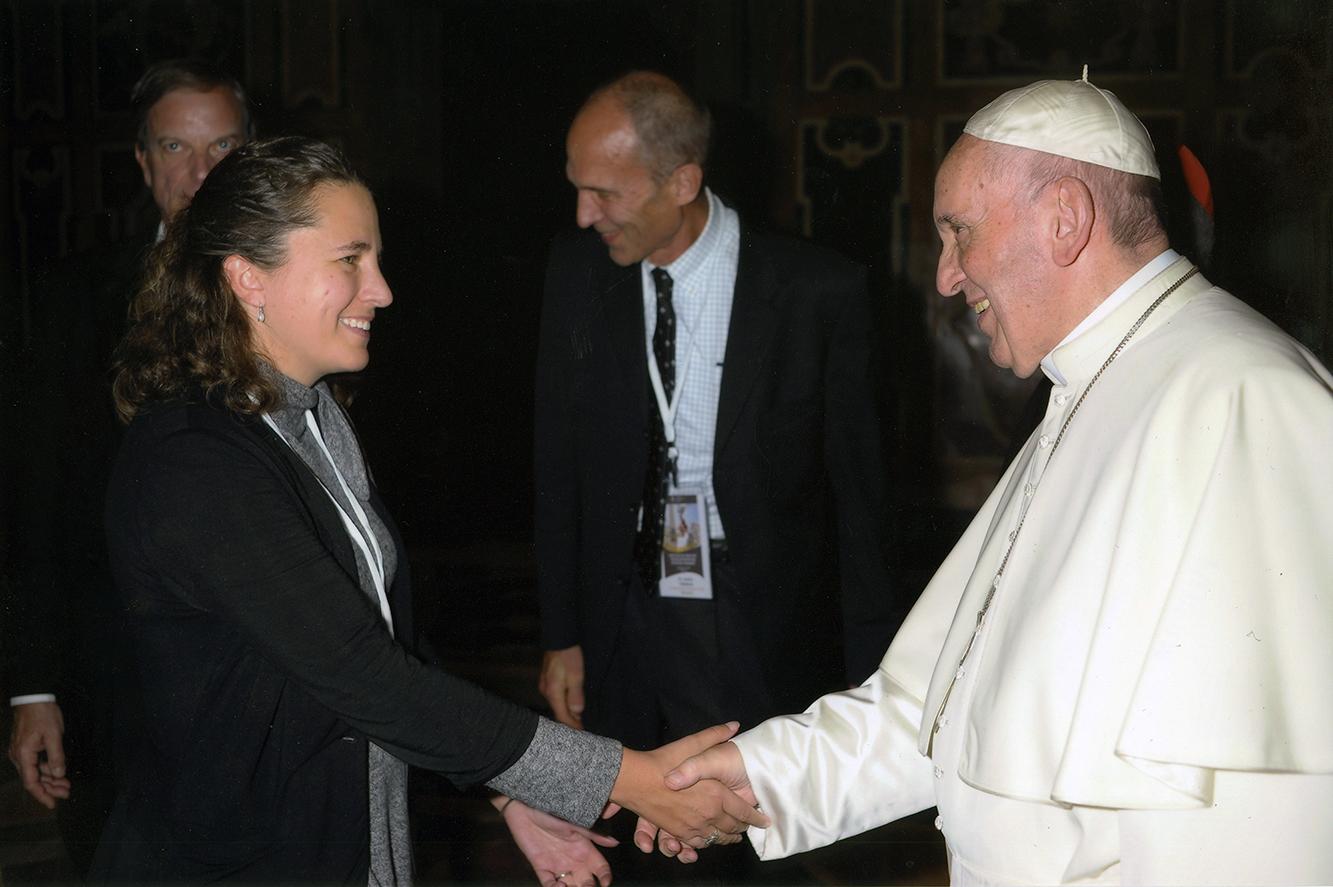A ground-breaking pontifical critique of nuclear weapons affirms the new treaty to ban nuclear weapons. “The threat of use [of nuclear weapons], as well as their very possession, is to be firmly condemned,” Pope Francis told 400 clergy, diplomats, campaigners and Nobel laureates gathered in the Vatican on 10-11 November.
“This a potentially historic moment for faith-based engagement in nuclear disarmament”, said Dr Emily Welty, vice-moderator of the World Council of Churches Commission of the Churches on International Affairs (WCC-CCIA) who was also participating in the conference as a member of a four-person WCC delegation. Also representing WCC were Peter Prove, CCIA director, Jonathan Frerichs, WCC consultant on disarmament and Michael Lindgren of the Church of Sweden.
Welty noted that in condemning not only the use but also the possession of nuclear weapons, Pope Francis “has moved the position of the Catholic Church on nuclear disarmament forward in a very significant way. By linking possession, use and the threat of use, Pope Francis has set a new framework for Catholic debate and action over nuclear weapons.”
Prove observed that with this statement, Pope Francis also offers “a powerful moral affirmation of the Treaty on the Prohibition of Nuclear Weapons” (TPNW), which was adopted at the United Nations in July. The TPNW--which bans the possession, use and threat of use of nuclear weapons--is cited in this year’s Nobel Peace Prize award to the International Campaign to Abolish Nuclear Weapons (ICAN). The WCC, which has been advocating for nuclear disarmament for most of its almost 70-year history, has been an active participant in ICAN since 2010.
A guide out of the prison of fear
ICAN director Beatrice Fihn echoed a key question asked by Pope Francis and others this week: How sustainable is a stability based on fear?
“Fear has guided global relations, human relations for over 70 years,” said Fihn. “The powerful created nuclear weapons to control the world, but it’s clear that the weapons have controlled us. They have guided every step of geopolitics, and continue to be the driver of conflict between the great powers. Nuclear weapons have pinned leaders into corners… and weighed noble ideals and bold plans for peace down with words like deterrence and détente.”
Through these dark decades, people of faith have been a consistent light, she added, “a constant voice pulling us back from the brink of annihilation, a steady guide out of this prison of fear we created.”
The Holy See was the first state to ratify the TPNW when it was opened for signature and ratification on 20 September. So far, 53 states have signed the treaty, and three have taken the further step of ratification. According to Welty, “the Holy See’s signature and ratification of the treaty should energize and motivate all of us to urge our own countries to join this important and inspiring moment by advocating for signature and ratification in our own contexts.”
In his audience with conference participants, Pope Francis described nuclear weapons as existing “in the service of a mentality of fear that affects not only the parties in conflict but the entire human race.”
Pope Francis concluded: “Nuclear weapons cannot constitute the basis for peaceful coexistence between members of the human family, which must rather be inspired by an ethic of solidarity.”
Paths to peace converge
The Vatican promotes ‘integral human development’ as a path to peace. The approach has much in common with the ecumenical ‘Pilgrimage of Justice and Peace’. The Holy See’s secretary of state Cardinal Pietro Parolin outlined key concerns about nuclear weapons from this perspective, including the unacceptable humanitarian and environmental impact of nuclear weapons, the fact that the human and economic resources spent on nuclear weapons are a costly diversion from peace-building and integral human development, and that nuclear weapons engender a climate of fear, distrust and conflict.
Bishop Robert McElroy of the US Conference of Catholic Bishops stressed that churches must be witnesses for a nuclear-weapon-free world. “For the church to contribute meaningfully to the attainment of such a dismantling, it must help both the Catholic community and the nations of the world to engage in new forms of thinking: a conversion to an ethic of the universal common good, a conversion to the chilling reality that nuclear arsenals undermine rather than secure peace, and a conversion to building strategies of peace in recognition that the strategies of war are bankrupt and destructive.”
Although nuclear powers often refer to the Korean crisis in their criticisms of the new nuclear ban treaty, progress can emerge from crisis. The UN high representative for Disarmament Affairs Izumi Nakamitsu observed that the Partial Test Ban Treaty was signed just one year after the Cuban Missile Crisis, and the Non-Proliferation Treaty was agreed just six years after the same dramatic events.
“WCC and its member churches advocating for disarmament make much the same moral and spiritual critique of nuclear armaments as that offered by Pope Francis and discussed in this important conference”, said Prove. “We pray that His Holiness’s message at this pivotal moment will help build hope, and transform long-entrenched attitudes and promote progress towards a world finally free from the threat of nuclear weapons.”
WCC Statement towards a Nuclear-free World
Nobel prize-winner ICAN says it will work for full nuclear ban
